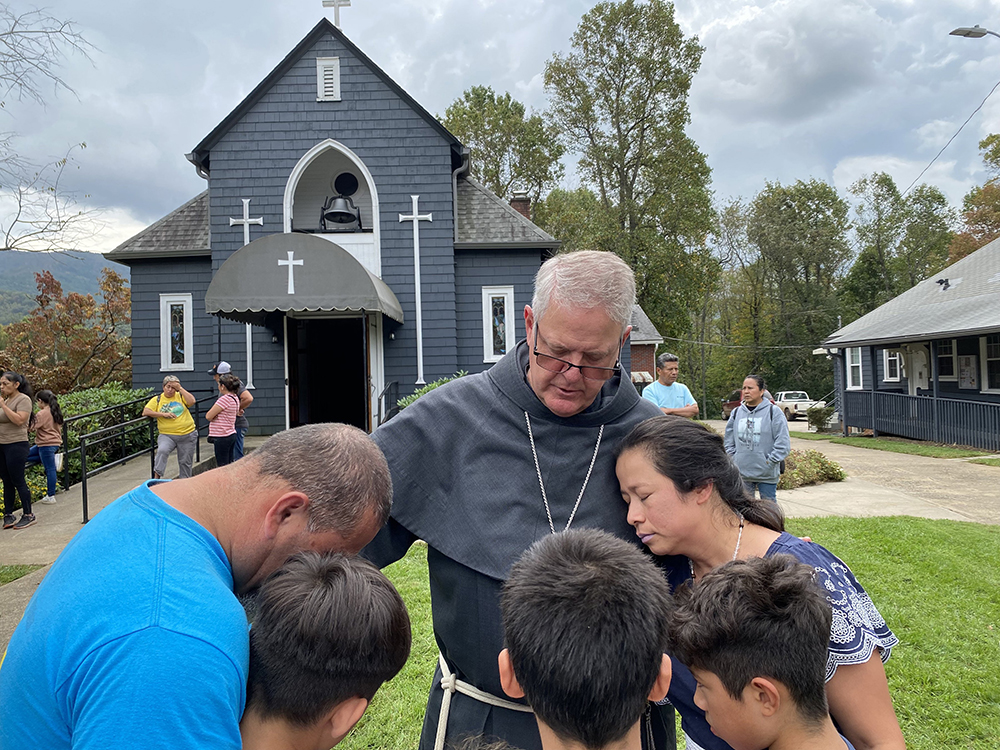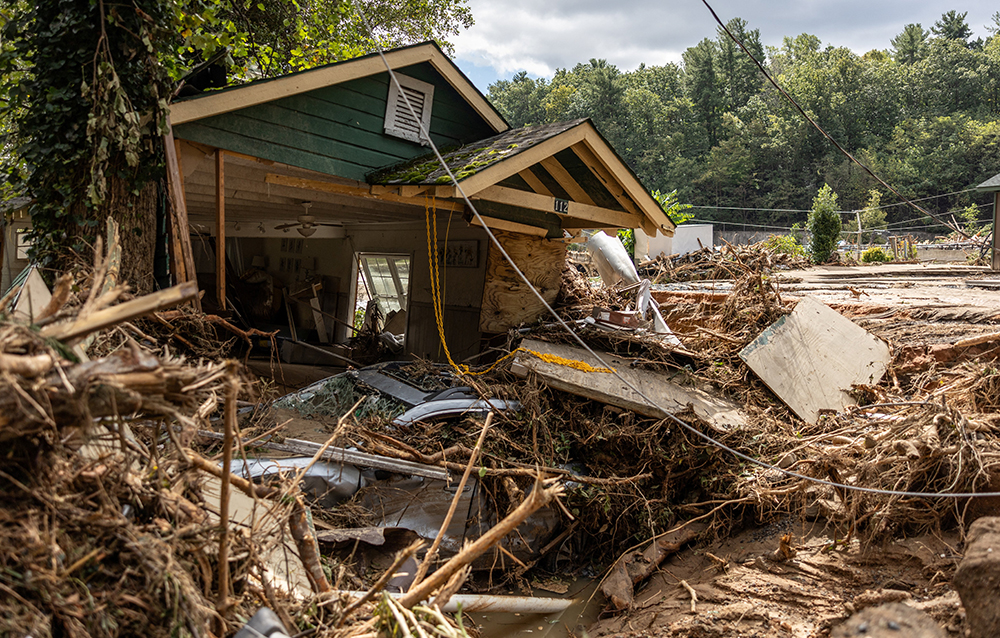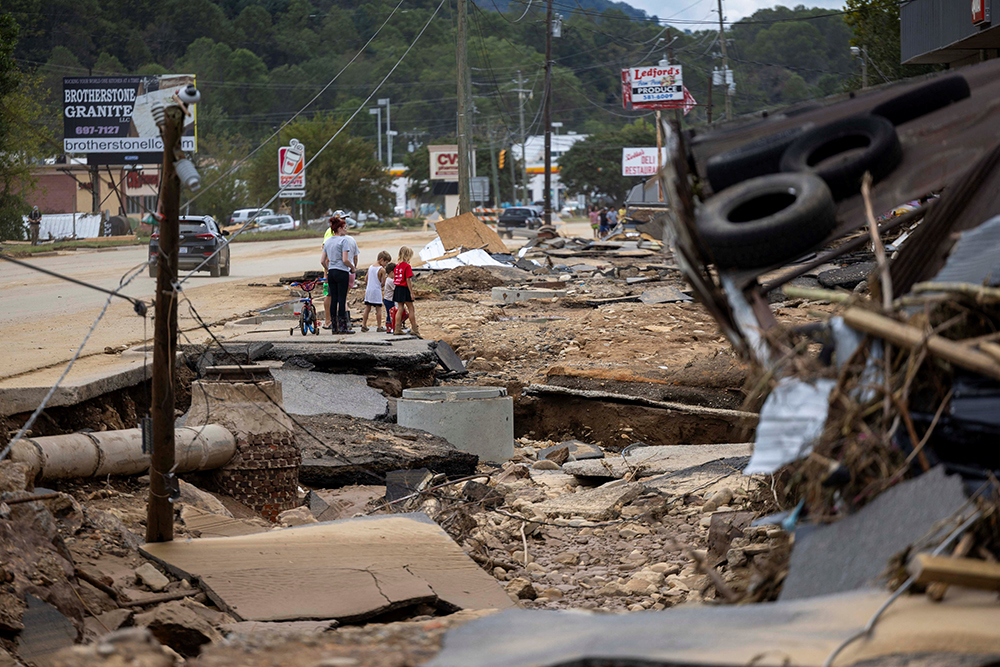
PROSPECT HEIGHTS — A week after the remnants of Hurricane Helene swept through the western part of North Carolina, Msgr. Patrick Winslow said everyone leading the Diocese of Charlotte’s response and recovery efforts is still trying to understand the full extent of the damage.
Msgr. Winslow, the diocese’s chancellor and vicar general, said that every day that communication capabilities are restored, more information and images trickle in about families whose homes were destroyed or people in a particular region who are in need.
What he says he has seen is a western North Carolina that is unrecognizable.
“It is heartbreaking to see these scenes,” Msgr. Winslow told The Tablet on Oct. 3.
“The picture I have in my mind is when you have this rush of water cascading off of the mountains, going into these valley areas where often these beautiful mountain towns are situated,” he said. “Then, they instantly become something like a river — a fast, flowing, rushing river that … takes everything out in its path.”
The Diocese of Charlotte covers 46 counties in western North Carolina. More than half of those have been declared federal disaster areas. That region includes 44 of the diocese’s 92 churches, the majority of which sustained only minor damage.
As of Oct. 8, more than 232 people in six states have died due to the storm. At least 100 of those deaths are in North Carolina, as search and rescue efforts in the state continue.
Since the storm abated, the diocese has mobilized a multifaceted response.
Msgr. Winslow, who is coordinating the efforts, said the diocese is collecting items of highest need — food, water, clean clothes, and basic healthcare, hygiene, and baby items — and bringing them out by the truckload to people in the hardest hit areas. Within one week, donations to the Diocese of Charlotte Catholic Charities topped $650,000.

Msgr. Winslow added that priests across the diocese are embedded in their communities to help respond to the emotional and spiritual impact the storm has had. He acknowledged that need will only increase as time passes and said his message to the people is that the diocese will be there through it all.
“You’re not alone. We’re going to be with you through it all … for the short-term efforts and the long-term efforts,” Msgr. Winslow said. “We’re not going anywhere. We’re going to continue to live our faith.”
On Oct. 4, The Tablet spoke with Bishop Michael Martin of Charlotte from one of the focal points of the diocese’s response — Immaculate Conception Church and Immaculata School in Hendersonville — as he prepared to visit more of the hardest-hit areas.
He said he has consistently seen people come for supplies, mainly asking for water. He told of one woman who, despite having no water or power at home, is helping those who arrive looking for certain supplies. He also highlighted the work of the diocese’s CFO, who makes round trips from Charlotte to Hendersonville with a U-Haul trailer full of supplies. He also noted that the diocese’s school teachers and administrators are working to figure out ways to provide a sense of normalcy for the children whose families were impacted.
“There’s just people trying to do everything in their power to bring some normalcy to people’s lives as best they can, and I’ve been so moved by that,” Bishop Martin said. “God created us to be that loving, that caring, and that responsive because that’s who he is.”
Bishop Martin, who was installed in the Diocese of Charlotte on May 30, acknowledged that he doesn’t yet have a complete grasp on the structure of the diocese.
Therefore, he’s deferring to others to lead the diocese’s response efforts, going wherever he’s directed, and focusing on his role as a faithful presence.
“I don’t have … a big wand to alleviate people’s misery. The only thing I can do is just be with people, pray with them, and help them know that Jesus … never leaves us alone,” Bishop Martin said. “That’s my primary purpose for being here today, just to reinforce that message for folks that are tired, worried, and just overwhelmed.”

As is often the case when disasters strike different parts of the country, people weigh in on the federal government’s response — often imploring them to provide more and work faster. Both Bishop Martin and Msgr. Wilson declined to comment on the government’s efforts in response to Hurricane Helene, stating the diocese is working independently.
Msgr. Wilson did, however, reiterate what he’s heard from people across the diocese.
“There’s a cry for help,” Msgr. Wilson said. “They want more help. It’s important. It’s critical.”
